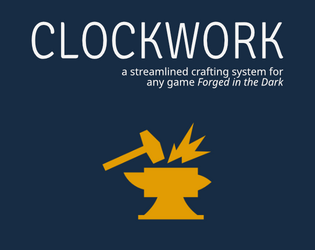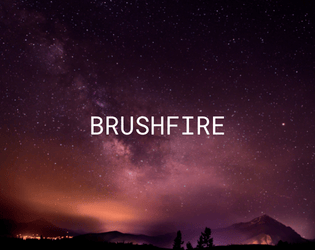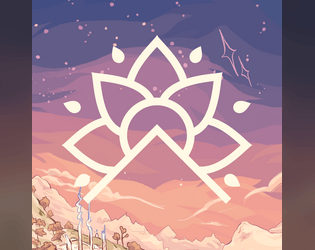Hi; this is going to be patched in the next update! Hopefully that'll come...soon.
Kavita Poduri
Creator of
Recent community posts
Thanks so much! This has now been fixed as well. As a heads up, Sparks currently responds with a somewhat generic message for 0d SbR rolls because the various SbR systems are somewhat inconsistent about how they deal with such things; this might be patched in a future update if the scene settles on something concrete.
This was, in fact, purely the result of me accidentally telling Sparks to roll a d12 for these instead of a d10; that has been fixed as of posting this comment, so you should be good to go. I'm unsure about how the "did not respond" error came to be; it's possible it might just be an error on the host's end. Please let me know if it continues to be an issue, or if you find specific conditions that can reproduce it!
Hello! I apologize for the error; the comment was deleted by mistake, and I couldn't find a way to restore it. That said, I'll do my best to address those concerns now.
I don't believe the Witch's note encourages gender essentialism at all; I made a point of being very clear that the feminine traits I encourage players to express in their Witches are socially determined, not biologically determined. (This is to say, the traits I list as examples are considered feminine in many specific societies, but are not biologically feminine in any sense.) The transmasculine and nonbinary people I've encountered so far haven't expressed any discomfort with the note or what it's intended to communicate, but if the topic does come up from such a person, I'll be happy to clarify.
I also vaguely remember your comment expressing surprise that Kipo and the Age of Wonderbeasts wasn't cited as a touchstone; Kipo was released after the v0.4 edition of this game, and its genre, while close, is slightly orthogonal to what Songs is intended to be.
factions are pretty much the same! i am trying to break away from the downward spiral by being really generous with teamwork maneuvers so that you don't have to burn through quite as much stress; basically trying to make sure that teamwork can bear a lot of the load that used to just crumble under the weight of doskvol.
yeah that's super true, and a big part of why i play games is to follow specific characters, so swapping them out doesn't interest me as much. "go on a bender and play someone else" isn't an option in my game for this reason...i might end up tying entanglements to something else. chaos, maybe? we'll have to see
Songs for the Dusk
A post-apocalyptic science-fantasy tabletop RPG about trying to build a better future.
On Twitter here and on Itch here, featuring a preview edition you can check out for free.
i'll just copy the pitch from the game's itch page:
We have no idea how long it's been since the cataclysm.
Once, we lived at the peak of an era of unbridled human Radiance. Then, everything came crashing down. The cataclysm tore down our cities, broke our machines, and rearranged the very continents beneath our feet. The societies of old Earth are gone. This is a new world, littered with the wreckage of what came before and run through with a strange new physics that feels almost like magic.
The world is littered with ancient machines running haywire, strange and exotic new life forms, and petty tyrants big and small vying for power. But for once we have a chance here: a chance, for once, to build something good, something better than all the human flaws and oppressive structures of the old world. And this is how we do it.
if you like socialist/materialist science-fantasy, give it a shot!
oh, yeah, i definitely get that impulse as well. even so, it's always clashed with the second impulse which like...a practical example of this is that i was raised Hindu (atheist Hindu but like, culturally Hindu) and i really don't know anything about Christianity? and i've to some degree actively resisted learning because i think my work will be stronger for operating completely without reference to Christian symbolism and symbology! and sure, i don't recognize that symbology as easily in the media i consume, but it's nice to have a personal and thematic aesthetic that exists entirely orthogonally to that throughline in most Western media. part of what's often frustrated me about PbtA games is that because the moves themselves are codified tropes, it makes it really tough to push the limits of the genre that a given game captures in a satisfying way, so i'm interesting in not laying that out in my work and seeing where it takes people. i think playtesting will probably have a lot to teach me about whether that's effective, but i'm very interested to try it out and see how far i can get on a minimum of that kind of information.
i don't think this was the first thing but i think one of the biggest changes i made was to RADICALLY shift the nature of claims: i renamed them foundations and instead of runnings ops to steal them from people, you just build them in your own space during downtime. i think that was the biggest change for me, and the one that most represents what Songs for the Dusk is.
i also...ended up cutting the healing clock and the reason i did that was mostly bc i think healing is boring? i think my general policy is you shouldn't make shit both boring and slow. healing is boring (because it doesn't add any fiction) and it's slow (because it's unreliable), so i just made it fast and reliable since i didn't want to spend time twisting healing into something interesting, and it's just more fun if your character can go home for a weak and that's all it takes for a stab wound to scar over.
other than that i ended up cutting "gangs" (bc i think experts have more character) and...that's it, most of what distinguishes my game from Blades is in its tonal adjustments, not in outright cutting stuff out. i probably should go through the game with a pair of garden shears tbh but i feel wary of doing that without playtesting. probably it's the wrong impulse to design your game with too much to start instead of too little but that's who i am ¯\_(ツ)_/¯
there's a really cool thing Blades in the Dark does where it hits you with the punchy setting description of "You’re in a haunted Victorian-era city trapped inside a wall of lightning powered by demon blood." but then immediately follows it up with an explanation of why that is:
The point of all this is to create a pressure-cooker environment for our criminal escapades. Traveling outside the lightning barrier is a very bad idea, so it’s impractical to “leave town and wait for the heat to die down” after you pull off a score. Everything the players choose to do has consequences for their characters and shifts the balance of power around in the city—driving the action for a sandbox style of roleplaying game.
i think this is really sharp, and it's a good example of what Blades is trying to do, which in some ways is to present the most elegant tabletop version of an open-world video game. the city's big and stuff goes down without you, but you're playing in a limited space and can't leave. it's why factions happen for the most part without player input, and it feels right for the kinds of story Blades is willing to tell.
more generally, i think one of the things that makes this difficult is that it's such a tough thing to implement story beats because it feels like it'll end up constraining creativity. i'm fine laying down gear because i'm confident if people want start calling my sparkshot guns like, boltspitters or something, they'll just do it and won't feel like they're playing the game wrong, but if i tell them "your story should integrate these tropes and these themes," they'll feel constrained by those beats? and i think the emergent narrative structure of play can be more interesting than the structure of a conventionally-told story, and i worry that sending people in aiming to capture those story beats might stifle creativity or limit people.






